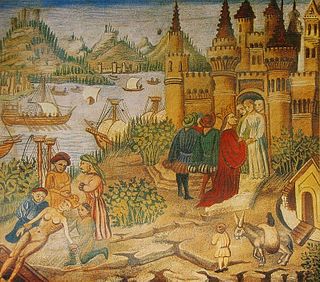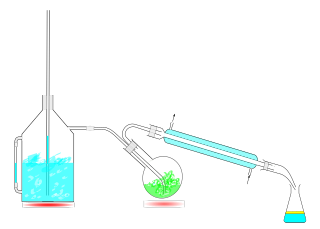Related Research Articles

Distillation, or classical distillation, is the process of separating the components or substances from a liquid mixture by using selective boiling and condensation. Dry distillation is the heating of solid materials to produce gaseous products. Dry distillation may involve chemical changes such as destructive distillation or cracking and is not discussed under this article. Distillation may result in essentially complete separation, or it may be a partial separation that increases the concentration of selected components in the mixture. In either case, the process exploits differences in the relative volatility of the mixture's components. In industrial applications, distillation is a unit operation of practically universal importance, but it is a physical separation process, not a chemical reaction.

Gin is a distilled alcoholic drink that derives its predominant flavour from juniper berries.

Brandy is a liquor produced by distilling wine. Brandy generally contains 35–60% alcohol by volume and is typically consumed as an after-dinner digestif. Some brandies are aged in wooden casks. Others are coloured with caramel colouring to imitate the effect of aging, and some are produced using a combination of both aging and colouring. Varieties of wine brandy can be found across the winemaking world. Among the most renowned are Cognac and Armagnac from southwestern France.

Salerno is an ancient city and comune in Campania and is the capital of the namesake province. It is located on the Gulf of Salerno on the Tyrrhenian Sea. The city is divided into three distinct zones: the medieval sector, the 19th century sector and the more densely populated post-war area, with its several apartment blocks.
Fractional distillation is the separation of a mixture into its component parts, or fractions. Chemical compounds are separated by heating them to a temperature at which one or more fractions of the mixture will vaporize. It uses distillation to fractionate. Generally the component parts have boiling points that differ by less than 25 °C (45 °F) from each other under a pressure of one atmosphere. If the difference in boiling points is greater than 25 °C, a simple distillation is typically used.
Ouzo is a dry anise-flavoured aperitif that is widely consumed in Greece and Cyprus. It is made from rectified spirits that have undergone a process of distillation and flavoring. Its taste is similar to other anise liquors like rakı, arak, pastis and sambuca.

A fractionating column or fractional column is an essential item used in the distillation of liquid mixtures to separate the mixture into its component parts, or fractions, based on the differences in volatilities. Fractionating columns are used in small scale laboratory distillations as well as large scale industrial distillations.

A still is an apparatus used to distill liquid mixtures by heating to selectively boil and then cooling to condense the vapor. A still uses the same concepts as a basic distillation apparatus, but on a much larger scale. Stills have been used to produce perfume and medicine, water for injection (WFI) for pharmaceutical use, generally to separate and purify different chemicals, and to produce distilled beverages containing ethanol.

The Schola Medica Salernitana was a Medieval medical school, the first and most important of its kind. Situated on the Tyrrhenian Sea in the south Italian city of Salerno, it was founded in the 9th century and rose to prominence in the 10th century, becoming the most important source of medical knowledge in Western Europe at the time.

Grappa is an alcoholic beverage: a fragrant, grape-based pomace brandy of Italian origin that contains 35 to 60 percent alcohol by volume. Grappa is traditionally produced in Northern Italy and is also widely consumed in places such as Argentina, Bulgaria, Georgia, Uruguay and Galicia.

Steam distillation is a separation process that consists in distilling water together with other volatile and non-volatile components. The steam from the boiling water carries the vapor of the volatiles to a condenser; both are cooled and return to the liquid or solid state, while the non-volatile residues remain behind in the boiling container.

Liquor or spirit is an alcoholic drink produced by distillation of grains, fruits, or vegetables that have already gone through alcoholic fermentation. The distillation process concentrates the liquid to increase its alcohol by volume. As liquors contain significantly more alcohol (ethanol) than other alcoholic drinks, they are considered "harder" – in North America, the term hard liquor is sometimes used to distinguish distilled alcoholic drinks from non-distilled ones, whereas the term spirits is used in the UK. Examples of liquors include brandy, vodka, absinthe, gin, rum, tequila, and whisky.

The University of Salerno is a university located in Fisciano and in Baronissi. Its main campus is located in Fisciano while the Faculty of Medicine is located in Baronissi. It is organized in ten faculties.

Shane Salerno is an American screenwriter, producer, and director. His writing credits include the movies Armageddon, Savages,Shaft, and the TV series Hawaii Five-0. He was chosen by director James Cameron to co-write the four sequels to Avatar, set to release in 2022, 2024, 2026 and 2028. He spent ten years writing, producing, financing, and directing the documentary Salinger, and co-writing with David Shields the companion book which became a New York Times bestseller. Salerno is also the founder and president of The Story Factory, which produces film and TV series based on literary properties, including the Showtime miniseries The Comey Rule in 2020.
Abella, often known as Abella of Salerno or Abella of Castellomata, was a physician in the mid fourteenth century. Abella studied and taught at the Salerno School of Medicine. Abella is believed to have been born around 1380, but the exact time of her birth and death is unclear. Abella lectured on standard medical practices, bile, and women's health and nature at the medical school in Salerno. Abella, along with Rebecca de Guarna, specialized in the area of embryology. She published two treatises: De atrabile and De natura seminis humani, neither of which survive today. In Salvatore De Renzi's nineteenth-century study of the Salerno School of Medicine, Abella is one of four women mentioned who were known to practice medicine, lecture on medicine, and wrote treatises. These attributes placed Abella into a group of women known as the Mulieres Salernitanae, or women of Salerno.

Joseph T. Salerno is an American Austrian School economist who is Professor Emeritus of Economics in the Finance and Graduate Economics departments at the Lubin School of Business at Pace University, Academic Vice President of the Ludwig von Mises Institute, and holds the John V. Denson II Endowed Professorship in the economics department at Auburn University. He earned his B.A. at Boston College and his M.A. and Ph.D. at Rutgers University.

The Salerno - Costa d'Amalfi Airport, located in the municipality of Pontecagnano Faiano and close to Bellizzi, is an airport in southern Italy, in Salerno city and the west coastal areas of Amalfi to the north and Cilento to the south. It is also commonly known as Salerno-Pontecagnano Airport.

Anthony "Fat Tony" Salerno was an American mobster who served as underboss and front boss of the Genovese crime family in New York City from 1981 until his conviction in 1986.

Unione Sportiva Salernitana 1919, commonly referred to as Salernitana, is an Italian football club based in Salerno, Campania. Salernitana returned to Serie A in 2021, after a break of 23 seasons, having finished second in Serie B. Previously, in 2015, I Granata were promoted to Serie B, having finished first in Lega Pro Prima Divisione – Girone C. The club is the legitimate heir of the former Salernitana Calcio 1919 and there is a sports continuity also with the former Salerno Calcio in the 2011–12 season which restarted from Serie D rather than from Terza Categoria due to Article 52 NOIF of FIGC.
References
- ↑ Forbes, Robert James (1970). A short history of the art of distillation: from the beginnings up to the death of Cellier Blumenthal. BRILL. ISBN 978-90-04-00617-1 . Retrieved 26 June 2010.